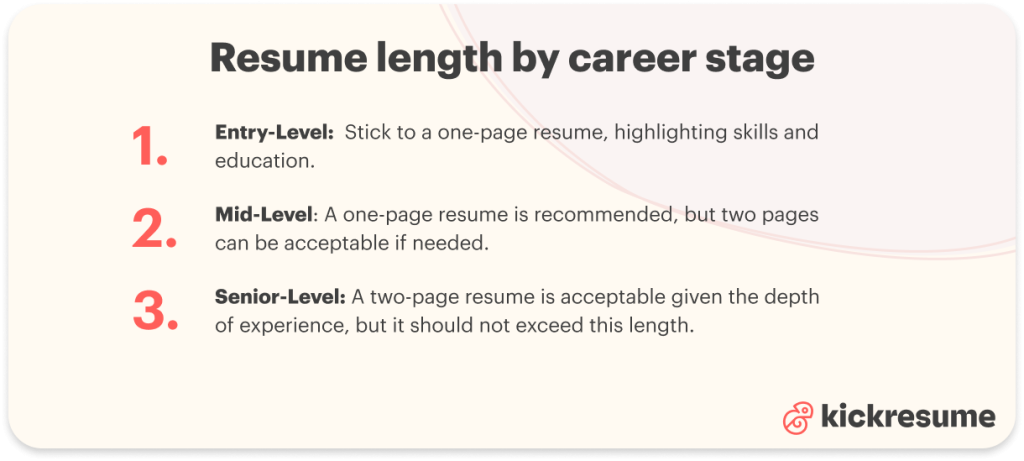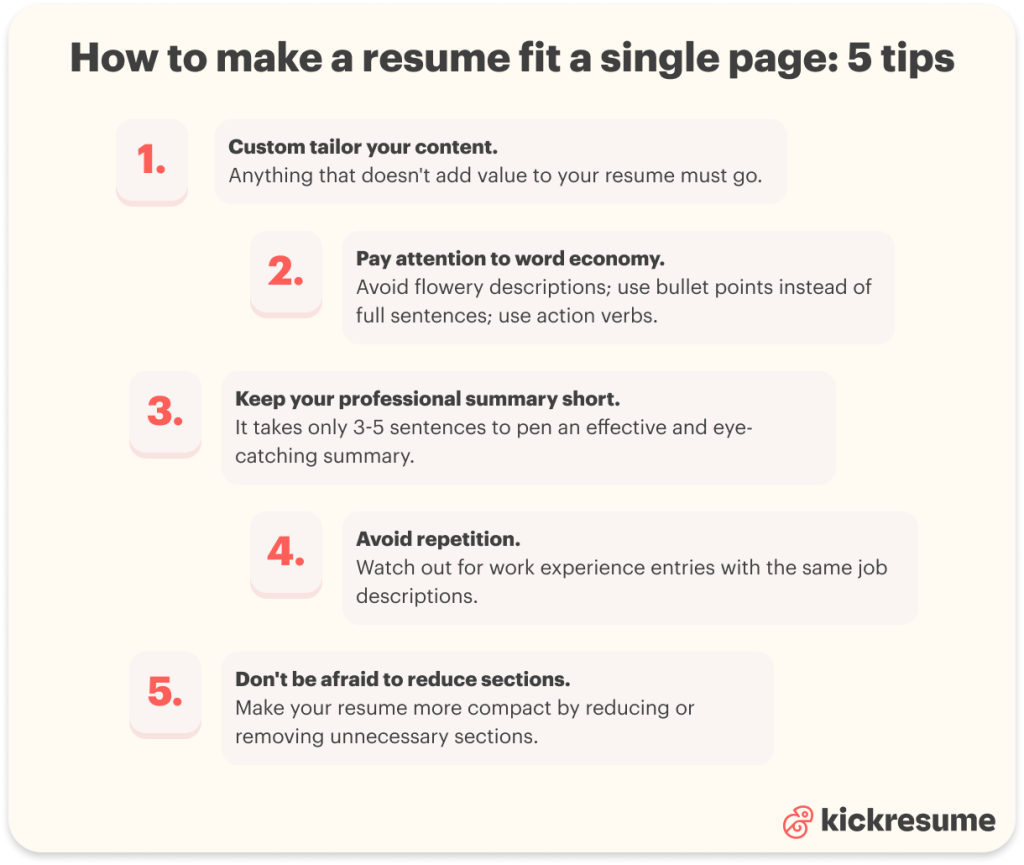How long should a resume be? You must've wondered about this at some point in your life. Let us assure you, you're not the only one.
The golden rule is to keep your resume to a one-page format – concise, focused, and easily digestible. But, as it's often the case, nothing is set in stone.
The length of your resume depends greatly on a number of factors, such as: where you are in your career; or which field you wish to make your career in.
In this article, we answer the following questions:
- How many pages should a resume be?
- Can a resume be 2 pages?
- How far back should a resume go?
- How to make a resume fit one page?
But first...
- What is a resume?
- How many pages should a resume be?
- Can a resume be 2 pages?
- How long should a resume be for an entry-level position?
- How long should a resume be for a mid-level position?
- How long should a resume be for a senior-level position?
- Resume vs CV: What is the (length) difference?
- How far back should a resume go?
- When can you leave out a job entry?
- How to make your resume fit one page?
- Key takeaways: How long should a resume be?
What is a resume?
The chances are, you most likely know the answer to this question. But just in case, let's refresh your memory.
A resume is the most important element of any job application. It is the initial point of contact between you and the recruiters.
Resume offers prospective employers a brief overview of your career history. It showcases your professional background and skill set by providing a concise summary of:
- Who you are as a professional;
- Your work experience (accompanied by descriptions of your responsibilities and achievements);
- Your education;
- Any relevant skills you possess (including certifications, awards, or other acknowledgements).
The tricky part is finding the right means of presenting all this information in a clear, organized, and professional manner.
One way to achieve this is to make sure your resume has the right length.
How many pages should a resume be?
Given all the information your resume needs to communicate to the recruiters, you might ask yourself: “Should resume be one page?”.
Your resume needs to hit the sweet spot. Long enough to highlight your achievements and skills, yet concise enough to keep recruiters engaged. It’s a delicate balance.
As far as the general consensus goes, keeping your resume to only one page seems to be the best way of achieving this balance.
This overwhelming preference is mainly due to a very pragmatic reason – it saves time. And time is a precious commodity. Why?
Because recruiters spend about 6 seconds on each application.
On average, hiring managers are said to need only 6 seconds to determine whether you'd be a good fit for their company or not.
In this brief moment, a recruiter scans for key info: your past jobs, education, and skills that match the job they're trying to fill. This is why having a resume that's clear, to the point, and well-organized is indispensable.
If you don't have your resume yet, visit our AI Resume Writer which can automatically generate the entire resume for you. It'll take only a few seconds.
Can a resume be 2 pages?
As we've said, a one-page resume is the standard. But that doesn't mean that you can't deviate from this standard and still succeed. In fact, there are cases where choosing a two-page format would be more fitting.
One way to find out if a two-page resume is the way to go for you is to look at where you currently are in your career. Different stages call for a different approach to resume length.
Which category do you belong to?
- Entry-level (0-2 years of experience)
- Mid-level professional (3-10 years of experience)
- Senior-level professional (10+ years of experience)

How long should a resume be for an entry-level position?
It goes without saying that you should definitely stick to a one-page resume.
If you're looking to fill an entry-level position, you're probably either:
- Still a student
- A recent graduate
- A job hopper
- Or a career changer
In any case, the lack of practical work experience is your Achilles heel. But there's a way around it...
You don't have an extensive work history or a high level of expertise. And that's okay – the tasks and responsibilities of an entry-level job position are generally more basic compared to higher-level positions.
Still, there's a way you can make the most of the many skills, hard and soft, that are already in your arsenal. We advise you to consider opting for a different resume format altogether.
Different resume formats can draw the recruiters' attention to different resume sections. Simply by visually emphasizing, or de-emphasizing, their importance.
Why use a chronological resume (the one that is mostly concerned with your work experience), when you can highlight your transferable soft skills and hard skills by choosing to write a skills-based resume instead.
How long should a resume be for a mid-level position?
Here's where the waters start to be a bit muddier. Nevertheless, our recommendation is: try to stick to a one-page resume. However, if you feel that you simply can't fit all your relevant contributions and achievements into one page, don't be afraid to stretch your resume to two (full) pages.
Friendly warning though, if you do use a two-page resume, make sure your second page is filled in its entirety!
This doesn't mean that you should try to artificially inflate the size of your resume. There's hardly anything more unprofessional than padding your resume with fluff.
It can make you look unfocused, haphazard, and unconscientious. Believe us, the recruiters can always tell.
How long should a resume be for a senior-level position?
If you're a senior-level professional, your involvement in the workforce might span 10+ years. Given the depth of experience and range of skills typical for senior roles, a two-page resume is not only possible but sometimes necessary.
Just remember, a resume should never exceed two pages!
Should you submit a three-page resume, you're risking losing the reader's attention. And in the world of job hunting, that is an act of self-sabotage. Don't forget the 6 seconds rule! It applies to resumes of all lengths.
This two-page resume should highlight all your strong suits, like:
- A deep knowledge of your area of specialization;
- Strong leadership abilities;
- The ability to manage complex projects;
- Strategic decision-making;
- Conception and implementation of long-term strategies;
- Development and guidance of others.
Resume vs CV: What is the (length) difference?
You might've done a double-take just now.
Yes, there is a difference between the two.
In Europe, Asia, or the Middle East the two terms can be used interchangeably. However, in Northern America (the U.S.A. and Canada) there's a clear distinction between the two documents, mainly in their: purpose, content, and length.
1. Purpose
- Resume: Resume is used as a part of job application across most industries. It presents information that is the most relevant for the position you're applying for. Each resume is custom-tailored to specific job postings.
- CV: CVs are used in academia, scientific, and research fields. Unlike a resume, a CV isn't usually customized for each job application.
2. Content
- Resume: The core of a resume consists of your professional summary, work experience, skills, and education. Other sections may include: volunteering, certificates, or awards.
- CV: It extensively details your academic history, such as: description of your degrees; your teaching experience; involvement in research projects; lecturing at conferences; list of your publications; or professional references.
3. Length
- Resume: Resumes are brief and targeted. Their length is between 1-2 pages. We strongly advise against anything longer.
- CV: As CVs cover your entire academic career, there really is no limit to its length. CVs can span several pages – sometimes even 15 and more.
How far back should a resume go?
You may ask yourself: “How long should a resume be for 20 years experience?”. As your experience in the workforce grows, so does your potential resume content. The more time you spend working, the more deliberate you'll have to be about which information to keep and which to let go off.
There is an unwritten rule for how far back should a resume go – the work experience on your resume should not be older than 10 or 15 years. This is more than enough to showcase your career growth and relevant skills without overloading your resume with outdated information.
The work landscape changes fast, and the skills you've picked up 11 years ago may not be so relevant to the corresponding job position now.
When can you leave out a job entry?
There's a way how to describe the work experience on your resume properly. It entails quite a lot of information:
- The name of your employer
- The name of your job position
- Dates of employment
- What you learnt
- What value did you bring to your employer
- How did your skills impact your team
Do what you can, you'll only manage to fit around 3-4 job entries a page.
If you need help weeding out unnecessary job entries, consider the following questions:
- Is this job entry older than 10-15 years? Older job entries don't necessarily reflect the level of your current skills and capabilities. Recruiters are interested in your most recent jobs anyways.
- Is this job entry relevant to the position I wish to fill? Relevancy is key! Focus on jobs and roles that highlight your qualifications for the position you're applying for. Omitting irrelevant job entries keeps your resume concise and focused. For example, if you're applying for a mid-level position in marketing, you don't have to mention the part-time babysitting gig you did while in college.
- Does this job entry involve the same achievements and duties as my other entries? Keep in mind that a resume is just a summary of your career. In your work experience, you've probably held similar positions in different companies. If this is your case, choose to highlight only the most significant or recent ones.
In short, anything that doesn't add value to your resume must go.
Remember, the goal of your resume is to present the most compelling and relevant experiences and skills. It's a strategic selection that should convince the recruiters that you are the right person for the job.
Keep your resume focused, relevant, and concise to make the strongest impact.

How to make your resume fit one page?
If you're still scratching your head over how to fit your resume to just one page, here are five tips you may find useful.
- Custom tailor your content.
Anything that doesn't add value to your resume must go.
- Pay attention to word economy.
Avoid flowery descriptions; use bullet points instead of full sentences; use action verbs.
- Keep your professional summary short.
It takes only 3-5 sentences to pen an effective and eye-catching summary.
- Avoid repetition.
Watch out for work experience entries with the same job descriptions.
- Don't be afraid to reduce sections.
Make your resume more compact by reducing or removing unnecessary sections.
Now, let's look more closely at each of these 5 tips and explain in depth what you should do to fit a resume into one page.
1. Tailor your content.
You should custom tailor your resume to fit a specific job description each time you're sending a new application. This will help you eliminate any unnecessary information that might take up precious space.
Make the content of your resume align as closely as possible with specific job requirements. Emphasize the skills and experiences that showcase your suitability for the particular position:
- Go back to the job posting.
- Identify keywords and phrases related to the job description and candidate requirements.
- Select your job entries based on which best connect to the said keywords.
- In your work experience descriptions, go into detail about specific achievements and successes that make you the perfect candidate for the job.
- Every piece of information should add value, focusing on outcomes and impacts rather than just duties.
- If possible, use quantifiable metrics for stronger impact.
2. Word economy.
Sometimes, you can shrink the text volume in your resume just by rephrasing it better.
The aim here is to convey the maximum amount of information with the fewest words.
- Avoid flowery descriptions. Keep your sentences straight-to-the point, free of any unnecessary digresses.
- Use bullet points. Writing in full sentences can also be a waste of space. Instead, use bullet points to get the message across. It will make your resume more digestible, organized, and easier on the recruiter's eye.
- Use action verbs. Instead of “I did this” and “I did that” start your bullet points with action verbs like 'managed', 'developed', 'led', etc. This makes your accomplishments sound more impactful and cuts down on word count.
Look at this example of a candidate's work description:
Pretty exhausting isn't it? Descriptions similar to this are the surest way to annoy and bore the hell out of any recruiter. Your resume will go directly to trash.
The same job description can be easily fixed and rewritten. Following our tips you can go from boring and lengthy description, to something like this:
Marketing advisor | XYZ Corp
3. Keep your professional summary short.
Your resume summary can be another word trap. Many people make the mistake of trying to include too much information into their summaries.
Remember, this is supposed to be a short text. It's meant to be just a teaser of what the recruiter can find in your resume, not the whole resume itself. It takes only 3-5 sentences to pen an effective and eye-catching summary.
Take this as an example of an effective resume summary:
4. Avoid repetition.
This one is pretty self-explanatory. It directly ties to what we've talked about in previous paragraphs. Once you've finished writing your resume, check it again for any unnecessary repetitions, such as:
- Work experience entries with the same/similar descriptions
- Repetitive use of the same adjectives
- Repetitive daily tasks descriptions
If you feel that you need to include several similar roles, focus on how you've grown or what new responsibilities you took on in each position. This can show career progression.
5. Don't be afraid to reduce sections.
While each resume section serves its unique purpose, sometimes the best way to make your resume more compact is to reduce or leave some of them out:
- Education details. If you've already spent several years working in a specific industry, it's not necessary to go into great detail in your “education” section. Avoid writing about your coursework, GPA, or academic awards. Listing just your degree, name of the institution, and the dates of study will suffice.
- Hobbies and interests. Unless your hobbies or interests relate directly to the job you're applying for, you can remove this section altogether.
Key takeaways: How long should a resume be?
The ideal resume length is typically one page. Two-page resumes are also acceptable in certain cases, but keep in mind that a resume should never be three pages or longer.
Resume length by career stage:
- Entry-level: Stick to a one-page resume, highlighting skills and education.
- Mid-level: A one-page resume is recommended, but two pages can be acceptable if needed to adequately showcase your achievements.
- Senior-level: A two-page resume is acceptable given the depth of experience, but it shouldn't exceed this length.
Include up to 10-15 years of work experience on your resume. Older positions may not be as relevant and can be omitted to save space and maintain relevance.
Tailoring your resume for each specific job application is key. It will help you keep your resume to one page by removing any information that doesn't connect to the job requirements. Always highlight the experiences and skills which are the most relevant to the position you're applying for.
If you need to make your resume fit into one page, you can use strategies such as word economy, avoiding repetitions, and removing less critical sections.
When trying to fit your resume into one page, don't just cram all the information together without any forethought. For your resume to be truly impactful, you need to pay attention to its readability and clarity. We have a solution! With our resume templates you'll find the right layout to elevate your resume.



